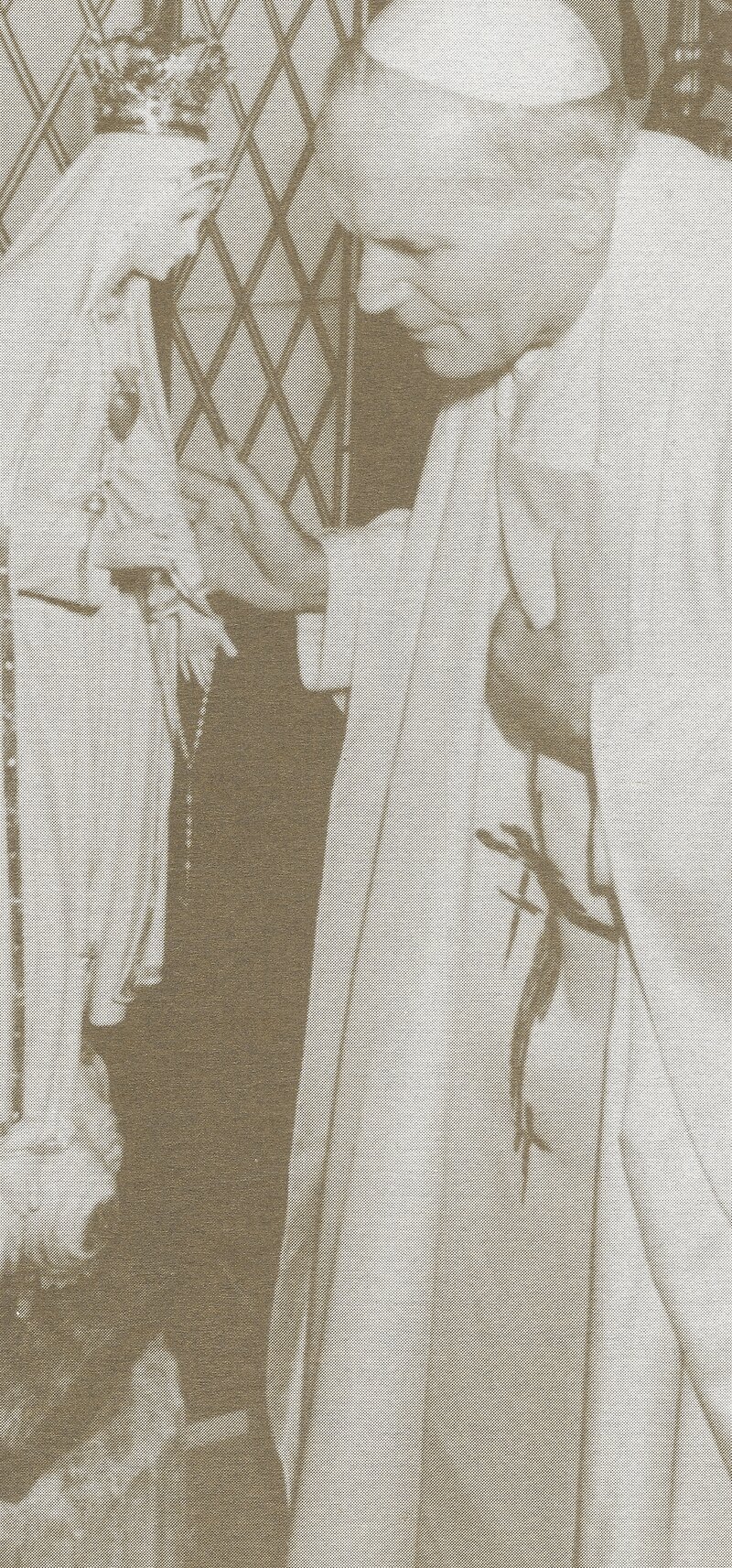Entrustment or Consecration?
Fr. J. Patrick Gaffney, SMM
Entrustment . . .
“Why is it the Marian Year encyclical. “Mother of the Redeemer,” makes no mention of consecration to Mary?
Many are asking that question. The best answer to those “so shocked” at the Pope’s “forgetfulness” (!) is to ask them to reread the encyclical; especially numbers 42-50; entitled Mary in the life of the Church and of every Christian. True, they will never
find the expression “consecration to Mary”. However, the profound meaning of consecration is described at length by the Vicar of Christ through another term; entrustment.
Does entrustment mean consecration? Both terms can be used in two ways: strictly and broadly. In the strict sense, they have a twofold meaning; a) the loving, total dedication of Jesus to the Father’s love; and b) our baptismal commitment to Jesus by which we are inserted into this consecration of Jesus to the Father. In the broad sense, they can refer to other persons and events which enhance our baptismal consecration to the Lord. Since the term consecration – and not entrustment – is primarily taken in the strict sense, the Holy Father appears to prefer entrustment when speaking about our commitment to Our Lady; she enhances our dynamic baptismal union with her Son.
. . . or Consecration?
It was at Fatima in 1982 that the Holy Father clarified the meaning of entrustment and consecration. In the important May 13th homily, the Pope spoke of “the consecration which for love of us, your Son made of himself to the Father. ’For their sake,’ he said, ‘I consecrate myself that they also may be consecrated in truth’ (Jn 17: 19)”. The Greek word translated as “consecrate” literally means “make holy,” “separate from the profane”. Jesus freely dedicates Himself to the Father. He makes the Father’s Will His Will. He lovingly accepts the Truth of the Father’s Holiness and the Truth that He is one with the Father. Jesus consecrates Himself.
Pope John Paul also uses the word consecration to proclaim that through this salvific offering of Jesus to the Father even unto death; the world has been consecrated, redeemed, made holy. “By the power of the redemption, the world and men have been consecrated. They have been consecrated to Him Who is infinitely Holy. They have been offered and entrusted to Love Itself, merciful Love”. “We desire,” says the Pope in his Fatima homily,” together with the whole Church, to unite ourselves with the consecration your Son made of Himself to the Father …”.
Consecration is an . . .
Consecration, strictly understood, is then an act of adoration, given to God Alone. Christ consecrates Himself to the Father. Baptized into Jesus the Lord, we, too, freely and lovingly acknowledge the Father’s Holiness and empowered by the Spirit, live that baptismal Holiness in our daily lives.
When we speak of “consecration to Mary”, we are using the term consecration in brood sense.
As we acknowledge that divinity in the strict sense can only be predicated of God; we also use the term in a broad sense for a person or event which so strongly represents and enhances the presence or the divine. For example, we speak of the official daily prayer or the Church as the Divine Office; we call the Mass the Divine Liturgy; and the Apostle John is often named the Divine; as Mary is called by Saint Louis de Montfort divine since she is Mother of the God-Man, Jesus. These usages of “divine” are clearly in the broad sense.

The Holy Father, in order to avoid misunderstandings, prefers the word entrustment over consecration to Mary. In his Marian Year encyclical, he stresses “entrusting” ourselves to Mary. It is the equivalent of consecration in a broad sense; Mary enhances and intensifies our baptismal life in Christ Jesus.
Return to The Queen: Articles
. . . Act of Adoration
The same holds for the term consecration. Strictly speaking, it refers to our baptismal dedication into Christ Jesus by which we are made one with His consecration in the Spirit to the Father. But broadly taken, the word is also used for an act of loving commitment to a person who enhances this fundamental consecration. Thus, we speak of consecration to Mary, using the term in this broader connotation.
The Holy Father, in order to avoid misunderstandings especially in this ecumenical age, prefers the word entrustment over consecration to Mary. In his Marian Year encyclical, he stresses “entrusting” ourselves to Mary. It is the equivalent of consecration in a broad sense; Mary enhances and intensifies our baptismal life in Christ Jesus.
Does the Holy Father mention consecration to Mary in the Marian Year encyclical? Definitely. Moreover, he clarifies its true meaning by calling it entrusting; he does so that we always understand that consecration has as its ultimate goal, our baptismal oneness with Jesus the Lord in His total surrender to the Father. We entrust to Mary our Baptismal consecration into Christ. This is the teaching of the Holy Father; which as he points out in number 48 of Mother of the Redeemer, is the meaning of Saint Louis de Montfort’s Act of Consecration. ” I would like to recall, among the many witnesses and teachers of this (Marian) spirituality; the figure of Saint Louis de Montfort who proposes consecration to Christ through the hands of Mary as an effective means for Christians to live faithfully their baptismal commitments.”


